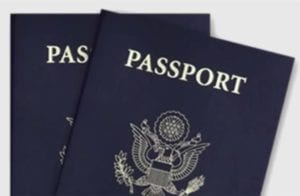To fulfill its promise of equality for all citizens, the U.S. State Department should drop gender altogether from U.S. passports.
 Last year, the U.S. Department of State announced that it would add a new gender specification, “X,” for U.S. passports. The “X” is a designation for those U.S. citizens who consider themselves, “non-binary, intersex, and gender non-conforming,” as opposed to “M” or “F.” Last week, the announcement became reality. As of April 11, the “X” option was officially available for use on U.S. passport applications and would be reflected on U.S passports themselves.
Last year, the U.S. Department of State announced that it would add a new gender specification, “X,” for U.S. passports. The “X” is a designation for those U.S. citizens who consider themselves, “non-binary, intersex, and gender non-conforming,” as opposed to “M” or “F.” Last week, the announcement became reality. As of April 11, the “X” option was officially available for use on U.S. passport applications and would be reflected on U.S passports themselves.
The U.S. State Department said it added the “X” gender designation to “M” and “F” on passports to promote fairness and equality.
 The State Department said it made the change to promote “the freedom, dignity, and equality of all people – including LGBTQI+ persons.” The change is to help ensure “the fair treatment of LGBTQI+ U.S. citizens, regardless of their gender or sex.” No medical certification is necessary for U.S. citizens to choose the “X” designation.
The State Department said it made the change to promote “the freedom, dignity, and equality of all people – including LGBTQI+ persons.” The change is to help ensure “the fair treatment of LGBTQI+ U.S. citizens, regardless of their gender or sex.” No medical certification is necessary for U.S. citizens to choose the “X” designation.
Passports are a critical form of personal identification. Passports not only certify a person’s identity but their national citizenship as well. For travelers, U.S. passports can be used to fly domestically under the Real ID law. Plus, they’re essential, of course, to fly internationally. They are the only personal identification document that Americans can use to travel to other nations and return to the U.S. They are good on any mode of transportation.
Designation “X” may be a powerful symbol, but will likely bring LGBTQI+ U.S. citizens unwanted attention and won’t succeed in ensuring fair treatment.
While the new gender specification “X” may be a powerful symbol of inclusion for LGBTQI+ citizens, I question whether the “X” designation can fulfill the State Department’s expectations. Can it really help provide freedom, dignity, and equality for LGBTQI+ citizens? Or, will it hurt LGBTQI+ citizens to get fair and equal treatment while traveling? I believe it will cause LGBTQI+ U.S. citizens to be singled out for unwanted attention while abroad. It won’t fulfill its promise, nor ensure fair treatment.
When I read about the change last summer in a press statement by Secretary of State Anthony J. Blinken, I thought about two terrible episodes in world passport history, both of which affected members of my extended family.
In Nazi Germany, they used the “J” designation to separate Jews from Germans.
On October 5, 1938, Nazi Germany’s Reich Ministry of the Interior invalidated all passports of Jewish German citizens. The Ministry ordered all German passports held by Jews be surrendered for processing. The German government desired to permanently separate Jews from the rest of the German population. The Ministry stamped each of the German passports issued to Jews with a “J” to revalidate them. From there, as the saying goes, “The rest is history.”
I’m not saying that the U.S. State Department has a nefarious motive for adding the new gender specification “X” option. Quite the contrary. I believe the State Department has added the designation for inclusion. But when was the last time that anyone was included by a designation that excluded people from the mainstream?
In the Soviet Union, Stalin used the “fifth paragraph” designation to separate minorities from Russians.
In the old Soviet Union, and continued by Russia until 1997, their passport included the infamous “fifth paragraph.” The declaration of nationality was, in actuality, ethnic identity. It reinforced Soviet-era discrimination against minorities. The “fifth paragraph” was introduced by Joseph Stalin in 1932. Nationality was listed as Russian, Armenian, Tartar, Jew, etc. Like the Nazi “J” designation, this was part of the Soviet effort to permanently separate Jews and others from the Russian population.
The new gender specification “X” separates rather than includes LGBTQI+ U.S. citizens from the rest of the nation.
This new designation “X” disconnects LGBTQI+ U.S. citizens from the rest of the nation. History makes a compelling case that segregation and separation can never build inclusion and equality. Separate and equal are mutually exclusive in the real world. I anticipate problems, some serious, for LGBTQI+ travelers who use the designation “X.” Issues at airport security and immigration in many locations across the globe could be the tip of the iceberg. We can’t forget that some countries have laws criminalizing homosexuality, for example, and that even if they are rarely enforced, they can be devastating to LGBTQI+ persons. With the designation “X,” foreign governments will now be able to separate LGBTQI+ U.S. citizens from every other U.S. citizen.
By identifying LGBTQI+ U.S. citizens via their passports, we enable foreign governments to use anti-LGBTQI+ rules, laws, and prejudice against U.S. citizens.
While other countries have decriminalized homosexuality, many haven’t implemented any anti-discrimination protection laws. Call me paranoid, but local prejudiced immigration officials, for example, could easily pass along gender information to local police.
It’s even possible that some nations will use the designation “X” to quietly control access for work and/or visitation. There are more than a few nations which are unwelcoming to LGBTQI+ travelers at best and with the designation “X,” they will know who is who.
Currently, in order to apply for a U.S. passport, you must supply the U.S. Department of State with a wealth of personal information including your full name, date of birth, city, state, and country of birth, Social Security number, physical attributes, occupation, postal address, email address, parental information, etc., plus any other names you’ve used. To prove citizenship you’ll need a document such as a birth certificate or Certificate of Naturalization. You’ll also need to provide an acceptable, current personal ID. Finally, you’ll need to provide a current photograph in a specific format.
The U.S. State Department requires accurate, detailed information and documentation on passport applications, except for gender. It can be generalized and non-specific, so why require it?
In addition to the above personal information, you are required to supply your gender as either “M,” “F,” or “X,” or in other words, male, female, or something else. Think about that. The U.S. Department of State, to prove citizenship and identity, require you to provide them with a wealth of accurate and specific information, but when it comes to gender, the new gender rules are shouting that knowing your gender is unimportant to determine your identity and/or citizenship status, that’s it’s unimportant that they accurately and/or specifically tell any other nation your gender.
Considering the issues LGBTQI+ U.S. citizens are likely to encounter if they use the designation “X” on their passport and that the U.S. State Department doesn’t need gender data to identify its citizens, I have a modest suggestion.
The U.S. State Department can actually promote fairness and equality for all Americans by dropping gender from passport applications and the passports themselves.
The U.S. State Department should drop gender from its passports. It shouldn’t be required for passport applications or designated on the passport itself.
With the gender designation gone we’d just have one group left: U.S. citizens. By adopting my suggestion, the U.S. Department of State would fulfill its goals of equality and dignity for all by no longer artificially separating us by gender. It would also go a long way in having LGBTQI+ citizens treated fairly by not putting them in a separate class of citizenship by gender designation.
Secretary Blinken, it’s time to remove gender from our passports!

READ ALSO:
After ending cruise travel alerts, are cruisers now safe from COVID-19?
Do we need airport federal funding billions to improve infrastructure?
After many years working in corporate America as a chemical engineer, executive and eventually CFO of a multinational manufacturer, Ned founded a tech consulting company and later restarted NSL Photography, his photography business. Before entering the corporate world, Ned worked as a Public Health Engineer for the Philadelphia Department of Public Health. As a well known corporate, travel and wildlife photographer, Ned travels the world writing about travel and photography, as well as running photography workshops, seminars and photowalks. Visit Ned’s Photography Blog and Galleries.


